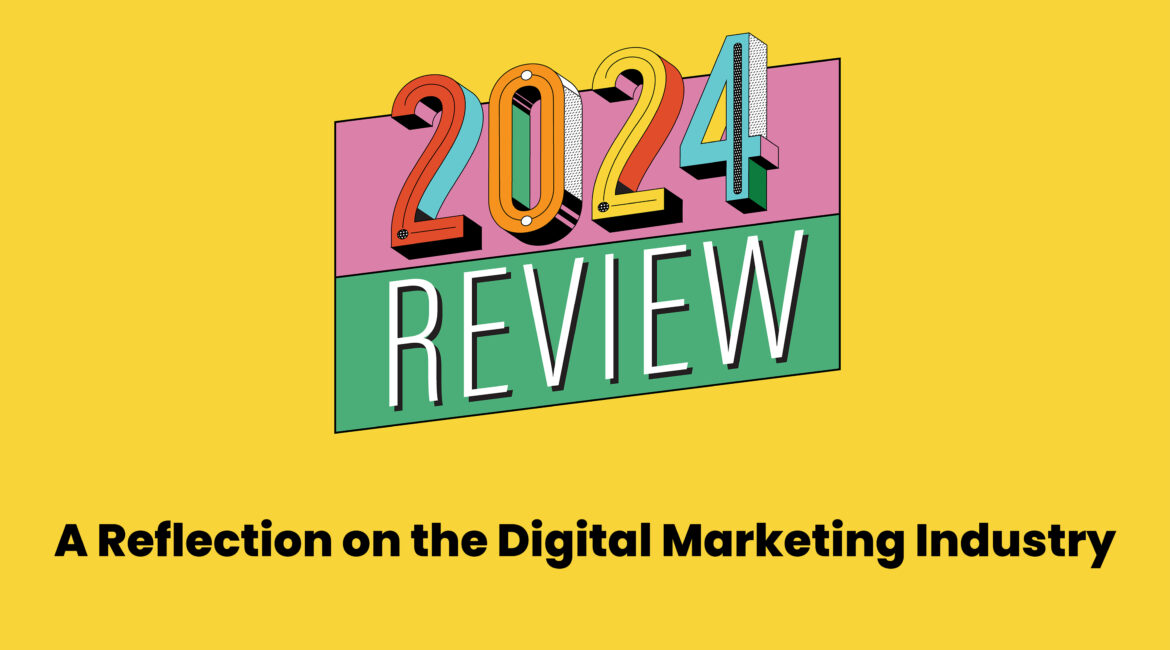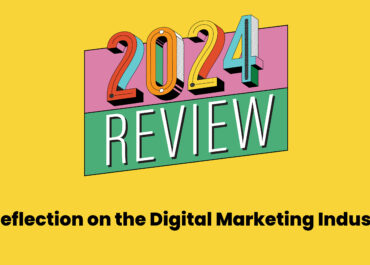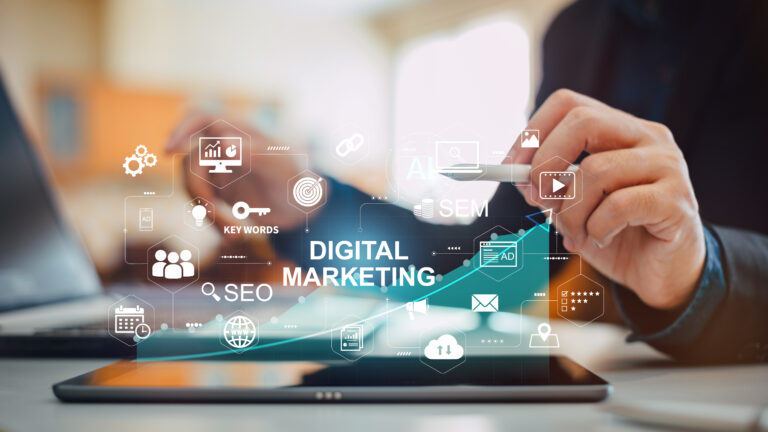2024 Review: A Reflection on the Digital Marketing Industry

The digital marketing landscape in 2024 is characterized by rapid technological advancements, evolving consumer expectations, and a growing focus on data privacy and sustainability.
Digital marketing strategies are increasingly becoming more personalized, interactive, and data-driven, as brands look to harness the power of new tools and platforms to connect with their target audiences.
As we move to the end of 2024, digital marketing is not just about driving sales—it’s about creating meaningful, personalized experiences that resonate with consumers in a fragmented, hyper-competitive online environment.
Today, let’s take a look at some real-world examples of digital marketing challenges and successes and what they mean for the future of our industry.
Real-World Examples of Digital Marketing Trends in 2024
- AI and Automation in Digital Marketing
Artificial intelligence (AI) is reshaping the way digital marketers approach customer engagement and campaign optimization.
AI-powered tools like ChatGPT are being used to automate content creation, from blog posts and social media updates to email marketing and product descriptions.
For example, brands like Sephora are using AI-driven chatbots for personalized customer service and product recommendations, helping customers navigate a wide range of beauty products efficiently.
Automated ad targeting is also becoming more precise, using AI to analyze vast datasets and predict consumer behavior.
Platforms like Google Ads and Meta Ads are increasingly using machine learning to optimize campaigns in real time, ensuring ads reach the right people at the right time with minimal manual input.
- Social Media Platforms and Influencer Marketing
Social media continues to dominate the digital marketing space in 2024, but with some shifts in platform dynamics.
While Instagram and Facebook still play significant roles in many brands’ strategies, the rapid rise of TikTok has redefined content creation and audience engagement.
Brands like Chipotle and Gymshark are leveraging TikTok’s unique format of short-form videos, often incorporating viral challenges and influencer partnerships to connect with younger, trend-savvy audiences.
The focus on micro-influencers—individuals with smaller, yet highly engaged followings—is growing as brands seek more authentic connections with consumers.
Studies have shown that micro-influencers can provide higher engagement rates and better ROI than celebrities or macro-influencers, making them an attractive option for digital marketers.
Glossier is a standout example of a brand that has built its marketing strategy around user-generated content, often reposting content from their customers to build credibility and trust.
- Personalization and Hyper-Relevant Content
Personalization is one of the cornerstones of successful digital marketing in 2024.
As consumers demand more tailored experiences, digital marketers are increasingly using data to customize content at an individual level.
Brands are relying on data analytics to track consumer behavior across devices and platforms, creating personalized content and offers that feel highly relevant.
For instance, Spotify uses its vast user data to create personalized playlists and recommendations, while also offering brands opportunities to target users with ads based on their listening preferences.
Similarly, Amazon continues to refine its recommendation engine, offering tailored product suggestions based on past purchases and browsing behavior.
In 2024, even email marketing is being transformed by personalization.
Platforms like Mailchimp and HubSpot allow brands to send hyper-targeted emails, not only based on demographics but also behavioral data, ensuring customers receive the right message at the right moment.
- Data Privacy and Ethical Digital Marketing
With increased consumer awareness about data privacy, digital marketers are facing new challenges in how they collect and use consumer information.
Following regulatory changes like the GDPR and Apple’s App Tracking Transparency, brands are adapting their strategies to ensure compliance while maintaining effective targeting.
For instance, Google’s shift away from third-party cookies is forcing digital marketers to explore alternatives for tracking and targeting users.
Google’s Privacy Sandbox is set to replace third-party cookies with more privacy-conscious options, which will significantly impact the way marketers conduct behavioral targeting and ad measurement.
Brands are also shifting toward contextual advertising, where ads are placed based on the content of a page rather than user behavior, which protects privacy while still being relevant.
Transparency is becoming a significant selling point for brands.
For example, Apple’s marketing strategy heavily leans on privacy, positioning itself as a consumer-first tech company.
The focus on data ethics is becoming an important differentiator, as brands aim to build trust with their audiences by being transparent about how data is collected and used.
- Sustainability and Purpose-Driven Digital Marketing
As consumers increasingly value sustainability, digital marketing campaigns are evolving to reflect a brand’s commitment to ethical practices and social responsibility.
Brands are integrating sustainability into their core digital marketing messaging, highlighting eco-friendly initiatives and social justice causes in their digital content.
Patagonia has long been a leader in purpose-driven marketing, and their digital campaigns continue to showcase the company’s commitment to environmental activism.
Similarly, brands like Toms and Allbirds are emphasizing their sustainable practices through social media ads, influencer campaigns, and dedicated content that educates consumers on their ethical sourcing and manufacturing processes.
This trend is also seen in the rise of cause-related campaigns.
For example, during Earth Day, many companies launch digital campaigns that focus on environmental conservation or climate action, often using video content, blog posts, and social media to reach and engage their audience.
Prediction for the Future of Digital Marketing
By 2030, digital marketing will be even more AI-driven and immersive, with augmented reality (AR) and virtual reality (VR) playing integral roles.
AR is already beginning to enhance the shopping experience, and by 2030, it could become the norm.
For example, Ikea’s app already lets users place virtual furniture in their homes using AR technology, helping them visualize products before purchasing.
This level of immersive digital interaction will likely extend to all kinds of retail, from fashion to home goods, making online shopping a much more interactive and experiential activity.
Additionally, blockchain could revolutionize digital advertising by making transactions more transparent and secure.
Blockchain could potentially reduce fraud in digital advertising, ensuring that brands get value from their ad spend and making the process more transparent for consumers as well.
Digital marketers will also have to embrace the growing importance of the metaverse, a virtual, interconnected world where brands can build immersive experiences and create entirely new consumer touchpoints.
Companies like Nike and Coca-Cola are already experimenting with branded spaces in the metaverse, and in the future, consumers may interact with digital products and services in a fully immersive, virtual world—redefining the way brands approach engagement, advertising, and customer loyalty.
As privacy concerns continue to evolve, digital marketers will need to find ways to adapt their strategies to ensure a balance between effective targeting and consumer trust.
Future digital marketing strategies will likely be built around consent-driven data usage, where customers actively choose to share their data in exchange for more personalized experiences.
The shift will require brands to be even more transparent and value-driven in their approach.
The Wrap Up
Folks, digital marketing in 2024 has been more dynamic and tech-driven than ever before.
With AI, data privacy changes, sustainability, and new social platforms, marketers must remain agile and forward-thinking.
In the end, the future will be defined by personalized, immersive experiences that balance ethical considerations with technological advancements and brands that invest in AI, embrace transparency, and innovate in areas like AR, VR, and blockchain will be well-positioned for success in the rapidly evolving digital landscape.
P.S. If you’re interested in getting your 2025 digital marketing efforts off on the right foot, then why not reach out to someone who knows how to get the most bang for your buck?
With Rain Digital by your side, your marketing budget will be utilized to its fullest, stretching your dollar to the max while propelling your company to a new level of digital marketing success.
Your time is valuable… Too valuable to waste.
Why not let the marketing professionals at Rain Digital take over your outreach efforts so your only job will be to sit back and enjoy your success?
It’s a new year, and new opportunities await you. Don’t let them pass you by again.
Reach out to Rain Digital today to start your future today!






